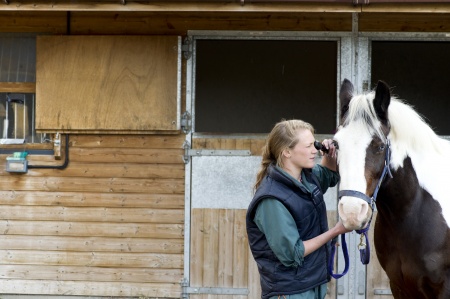
August 5, 2014, by Emma Thorne
The dangers of colic – Nottingham experts to appear on TV show exploring this equine illness
Experts from The University of Nottingham’s School of Veterinary Medicine and Science are to be featured on the Horse & Country channel in a programme which takes an in-depth look at common equine health issues.
Professor Sarah Freeman, Professor of Veterinary Surgery, will be seen using a model of a horse’s stomach and intenstines to show presenter Jenny Rudall how the animals digest their food for Vet Essentials, which airs on Wednesday August 6 at 9pm.
The programme will centre on the common digestive problem colic, a potentially dangerous condition which commonly results from a twisted gut or other digestive disorders.
Later in the programme, Professor Freeman and her team use another novel approach to demonstrate anatomy by using brightly coloured body paint to daub vital organs on to the side of the animals in the location in which they would actually appear inside their body.
Diagnosing colic can be tricky and it can be difficult to pick up the subtle changes in an animal that could be the early symptoms of the condition. In the programme, Professor Freeman talks through the range of procedures and techniques that vets use to establish the potential cause of a horse’s illness, including checking the animal’s pulse rate and the colour of its gums — a good indicator of blood flow around its body — and listening to its gut sounds.
One of the less glamourous parts of a vet’s job is also potentially one of the most dangerous in horses — the rectal examination. Students at Nottingham’s School of Veterninary Medicine and Science learn the technique, which can be one of the most essential tests in diagnosing colic, using a realistic scale model in the safety of the classroom.
Professor Freeman said: “Probably the most important thing which you can do as an owner is to know what’s normal for your horse, how it normally behaves, what its routine is and if anything changes or if you are worried about anything then get in touch and ask for some advice. There are lots of different types of colic and lots of different signs of colic but if you are concerned about anything then the most important thing is to get help as early as possible.”
Vet Essentials can be seen on Horse & Country on Sky channel 280 or can be watched online (£4.99 per month subscription applies).
No comments yet, fill out a comment to be the first

Leave a Reply